Tom Kepler's Blog, page 21
April 13, 2014
Sunday Bicycle Ride with My Montague Navigator at Riverbend Park, Oroville, California
It is such a joy to be able to travel by Amtrak with my Montague Navigator folding bicycle. Arriving at Oroville, California, to visit my family, I'm able to still take off and enjoy the ol' hometown of my birth in a slower, more enjoyable manner.
Chores is the theme of this visit to my parents--painting and driving almost every day. I've been riding some short rides of 3-5 miles, but the last two days this weekend I've gone a bit longer on my rides--twelve to fifteen miles. Today is Sunday, and I rode to Riverview Park along the Feather River.
I started with the 5.5-mile ride into Oroville. Stopping at the Subway for an avocado and cheese sub, I then did something unusual and stopped by Lots'a Java for a hot white mocha coffee. Riding to the river park, I ate half the sandwich and drank about two thirds of the coffee. (I tossed the rest of the coffee, wanting to sleep some tonight.) I then rode along the river on the park's trail for several miles. Returning home, I had a wonderful three and a half hour ride, finishing my sandwich when I arrived home.
Here are some photos of the day.
 On the way to the river: California poppies in April
On the way to the river: California poppies in April
 Just after stopping for a snack. Winter-pale but spring-happy.
Just after stopping for a snack. Winter-pale but spring-happy.
 On the Feather River trail--along with many others.
On the Feather River trail--along with many others.
 A pond down river from the park. Note my Iowa-white legs.
A pond down river from the park. Note my Iowa-white legs.
 Just an Oroville boy fitting in: safari hat, "homeless" basket, and bandolier bike chain.
Just an Oroville boy fitting in: safari hat, "homeless" basket, and bandolier bike chain.
 Love the Mediterranean climate foliage and the river sounds.
Love the Mediterranean climate foliage and the river sounds.
I'll be taking my folding bike back to Iowa in a few days, returning by Amtrak. Spending a week and a half on the sofa in the front room of my parents' mobile home, it's good to get away on the bicycle and enjoy a little exercise, fresh air, and silence. It's been a beautiful spring visit.
Copyright 2014 by Thomas L. Kepler, all rights reserved
Chores is the theme of this visit to my parents--painting and driving almost every day. I've been riding some short rides of 3-5 miles, but the last two days this weekend I've gone a bit longer on my rides--twelve to fifteen miles. Today is Sunday, and I rode to Riverview Park along the Feather River.
I started with the 5.5-mile ride into Oroville. Stopping at the Subway for an avocado and cheese sub, I then did something unusual and stopped by Lots'a Java for a hot white mocha coffee. Riding to the river park, I ate half the sandwich and drank about two thirds of the coffee. (I tossed the rest of the coffee, wanting to sleep some tonight.) I then rode along the river on the park's trail for several miles. Returning home, I had a wonderful three and a half hour ride, finishing my sandwich when I arrived home.
Here are some photos of the day.
 On the way to the river: California poppies in April
On the way to the river: California poppies in April Just after stopping for a snack. Winter-pale but spring-happy.
Just after stopping for a snack. Winter-pale but spring-happy. On the Feather River trail--along with many others.
On the Feather River trail--along with many others. A pond down river from the park. Note my Iowa-white legs.
A pond down river from the park. Note my Iowa-white legs. Just an Oroville boy fitting in: safari hat, "homeless" basket, and bandolier bike chain.
Just an Oroville boy fitting in: safari hat, "homeless" basket, and bandolier bike chain. Love the Mediterranean climate foliage and the river sounds.
Love the Mediterranean climate foliage and the river sounds.I'll be taking my folding bike back to Iowa in a few days, returning by Amtrak. Spending a week and a half on the sofa in the front room of my parents' mobile home, it's good to get away on the bicycle and enjoy a little exercise, fresh air, and silence. It's been a beautiful spring visit.
Copyright 2014 by Thomas L. Kepler, all rights reserved
Published on April 13, 2014 14:26
April 12, 2014
A Day Out with Mom #24: safe and sound, for now
 What's going to happen, I thought, when Mom wakes Dad up?
What's going to happen, I thought, when Mom wakes Dad up?He lies in bed, snoring after his trip to the breakfast room and back. A couple of shakes and "Harold, Harold?" and Dad wakes up, his cap now cockeyed on his head, his eyes slowly focusing.
We're lucky--he's feeling amiable today.
"Tom's here, Harold," Mom says. "He got in last night on the train."
That leads to train stories for Dad and sets the pace for today's visit. I notice that when I stop talking, Dad's eyes begin to close as he fades back to sleep. Therefore, I have to be lively and entertaining, joking and witty. I sit beside him on the bed that has been lowered close to the floor so that if Dad falls, the possibility of injuries is lessened. He now has an alarm so that if he gets out of bed by himself, the front desk is alerted. He's already fallen twice without injury.
I talk about spring, describing the fresh green of the grass and trees, the bright yellow of California poppies. Dad begins to fade, so I throw in the contrast of Iowa, the trees still bare, the grass still brown, and frost still riming shingles some mornings. Dad begins to fade. I talk bicycles, gardening, then settle on coffee. Dad has two cups, you betchya, for breakfast, and so does Mom, it so happens.
I grab Dad's leg and shake it affectionately a few times. It feels so emaciated--probably both from lack of eating and lack of exercise. Dad was recently in the hospital for a few days because he refused to eat and drink. He was intraveniously hydrated and then sent back to his extended care unit. He has also recently said he doesn't want to engage in physical therapy. "Well, he's tired," Mom says, and I can't argue with that.
But, as Dad was quick to say not so long ago, he's in pretty good shape, considering the shape he's in. He's about two months away from his ninety-fourth birthday.
After about an hour, I tell Dad we're going to go and let him nap. "Glad you came," he says, and he means it.
I'm glad, too. I see the rewards of the last year's efforts. My father and mother are nearing the end of their life cycles, but both are cared for--my dad by a professional care facility, my mother by my brother.
I don't know what tomorrow will bring, but I'm happy. Mom and Dad are safe and--considering the shape they're in--in pretty good shape. That I can take some credit is a source of great satisfaction and relief for me. I think Dad would agree with me: considering the situation I I've been confronted with, I've done a pretty good job confronting it.
Copyright 2014 by Thomas L. Kepler, all rights reserved
Published on April 12, 2014 05:00
April 7, 2014
Amtrak Again: Iowa to California--refining the process
 It is a faint blush of dawn, just west of Winnemucca, Nevada, and the rhythm of the tracks provides a background melody to my typing.
It is a faint blush of dawn, just west of Winnemucca, Nevada, and the rhythm of the tracks provides a background melody to my typing.I am about twelve hours away from completing my Amtrak train journey that lasts a little less than two days, including a lay-over in Sacramento and an Amtrak shuttle bus to my parents' hometown.
I've been refining my traveling ways this last year, having spent eight months of the last year away from my Iowa home.
I sit in my coach seat, a small pillow supporting my back while I keyboard. To my right in the window seat is a small ditty bag with a few extra clothes that I use while sleeping--the bag tucked into the curve of the reclined seat to lessen the angle and strain on my back, the pillow supporting my neck. My longest sessions of sleep come from this position during the night--Lazy-Boy luxury.
I am traveling to visit my family in California, and I'm focusing on bringing as little extra clothing as possible. I've bought clothes in California that I keep there, freeing me from having to pack a duffle bag full. Also, I'm collecting bicycling accessories in California so I don't have to pack tires irons, a multi-tool, tire pump, helmet, and such back and forth. My goal is to eventually transport only my Montague Navigator folding bicycle, a small underseat backpack, and a little almost-empty duffle. And if I can eliminate the duffle, that will be great.
I've bought shaving gear to keep in California, so I'm traveling hirsute this trip--a clean shave just before leaving and two days' growth at destination's end. I'm not too scruffy, since I'm not one of those guys who shaves and still has a blue tint to the face. (It would be more of a grey-white tint for me now, anyways.) I think I look okay. After all, I'm not teaching. I like to think of it as a limited, modified Jim Bridger look that fits in with my journey into the West.
A great deal of weight I carry onto the train is food. I'm working to lessen that, but I will still always have some. The Amtrak Zephyr does have a full meal service, and I eat breakfast and lunch, eschewing dinner because I don't want a heavy meal before sleeping, not with so little exercise.
I have been carrying water for the two-day trips. The snack bar sells water, though, so one way to lessen weight and bulk is to buy water at the snack bar. There are also water dispensers on the train. Check off one item. The snack bar, in addition to Amtrak's full-meal service, also sells some vegetarian food, so I can probably bring a little less food.
Some foods I will continue to bring, though. I plan to continue carrying a blanched almond and raisin mix--heavy but healthy nourishment. I have been bringing four apples with me and plan to continue doing so--again, healthy food in spite of the weight. Chapattis and cheese sticks are a great snack, especially with carrots, so those foods stay. Yes, food is weighty, but eating familiar, healthy food is a great way to make the trip more enjoyable and less draining. One good thing about the weight of the food--it lessens as the trip progresses.
The morning is still backlit by the sun that has not yet risen over the snow-topped mountains to the north of the train. The desert is colored with muted tans, faded greens, and the blondes of bleached grasses. The Zephyr passes through the sere beauty, lights on the distant slopes from isolated homes.
This trip is easier than the last trip that I made in January. I'm learning how to sleep better in a coach seat. I'm finding all the amenities provided by Amtrak's Zephyr--not the least the plug-in sockets at each seat. I'm settling in so that I can do some writing while traveling, such as this blog post that can be uploaded when in wireless range with my MiFi. Because I have recently retired, I enjoy Amtrak's slower pace, lower price, and the ground-level scenery. I also don't miss the frenetic pace of airline security and the high "people per square inch" (PPSI) count. I've found I've even acquired a few tricks that I can use when traveling by air.
Looking out the coach's window to my left and behind, the mountains are silhouetted a charcoal grey, the sky above a golden-reddish glory. Soon the sun will catch me. The Zephyr sounds its horn at an upcoming crossroad. An arroyo unwinds to the south, a sandy, serpentine memory of rain. The steepest peak to the southern range of mountains is bathed in sunlight. "It's a beautiful day beginning," sings the rhythm of the tracks.
I listen as I type.
Copyright 2014 by Thomas L. Kepler, all rights reserved
Published on April 07, 2014 08:24
April 2, 2014
Book Review: Pastime, a Spenser detective novel
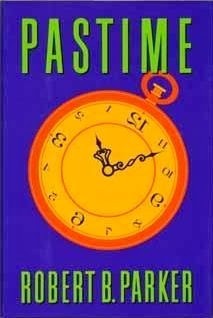 Not only is
Pastime
one of Robert B. Parker's best novels about the private detective Spenser, but it is also one that clearly demonstrates Parker's skill as a crime writer.
Not only is
Pastime
one of Robert B. Parker's best novels about the private detective Spenser, but it is also one that clearly demonstrates Parker's skill as a crime writer.Spenser's semi-adopted son, Paul Giacomin, visits Spenser in Boston asking for his help. He can't locate his mother, who has apparently left on an extended trip without telling him. While Paul's mother is somewhat lacking in motherly skills, he doesn't believe she would voluntarily leave her home for such an extended period without contacting him. Though Paul can't pay Spenser, he takes the case anyway as a favor to Paul. (Wikipedia)The central plot of finding Giacomin's mother plays out through Spenser's first person narrative, suspense arising from the disappearance of the mother, the arrival of heavy-hitting bad guys, and the usual stumbling around searching for clues that Spenser labels as his professional technique.
Typical to Parker's plot construction, though, Paul Giacomin is seeking answers not just about his mother but also about marriage and relationships. His mother and father's relationship is dysfunctional. Even though Spenser and his partner, Susan Silverman, have a life-long relationship, they are not married, nor do they live together--and Susan is wondering about marriage.
Not just marriage but also the idea of families is explored. One of the bad guys, Joe Broz, is dealing with a son who is an incompetent bad guy who cannot survive in the unforgiving world his father lives in. This dynamic intersects with Spenser's search for Giacomin's mother. Spenser's concept of family, Paul's exploration of family (including his current girlfriend), and Broz's family issues all become intertwined. Adding to this rich stew is Spenser's friend Hawk, a very tough hitman and enforcer--who possibly cannot love yet is involved in events.
What is the ideal relationship? How is loving defined and expressed? These questions become as powerful to the novel as the central quest to locate Giacomin's mother.
In typical Spenser style, it is not enough just to find Giacomin's mother. He wants and needs everything to turn out well--or at least as best it possibly can.
I've just finished reading all of Parker's Spenser novels. The movement of increasing involvement with the characters as the series progresses is truly an achievement for Parker, who passed away (while writing) in 2010. Literature shouldn't just tell a story; it should also inform the reader about life in some way--or at least be accessible to such ruminations. Parker's novel Pastime accomplishes that, providing the reader with the joy of considering significances.
Copyright 2014 by Thomas L. Kepler, all rights reserved
Published on April 02, 2014 06:00
February 26, 2014
Michael Crichton's The Eaters of the Dead and The 13th Warrior, a review of the book and movie
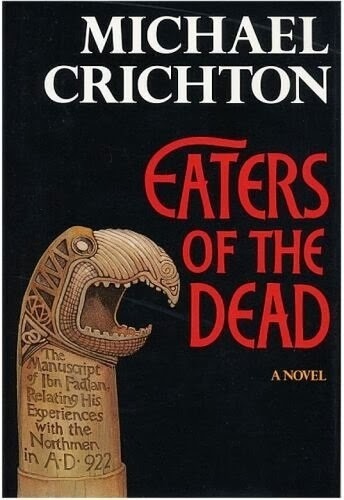 Year's ago I read the book and then watched the movie. This time I did it backwards, the movie,
The 13th Warrior
, and then the novel, The Eaters of the Dead. It was a better experience the second way around.
Year's ago I read the book and then watched the movie. This time I did it backwards, the movie,
The 13th Warrior
, and then the novel, The Eaters of the Dead. It was a better experience the second way around.When I first read The Eaters of the Dead and then viewed the movie, my experience was that the characterization of the antagonists in the movie did not match well enough how I had imagined the wendol in the novel. The second time around, viewing the movie first, I realized that the archetypal forces that Crichton was utilizing could hardly be matched by movie special effects--the imagination deals with archetypes on too personal a level.
The movie stays close to the novel's storyline, though, and provides excellent visuals of the primeval Nordic forests, the small sailing craft battling the inexorable sea, and the warrior culture of Europe in the 900's. Crichton's novel uses two real sources as a basis or beginning for novel: a narrative of a journey with the Northmen by Ahmad ibn Fadlan and the Anglo-Saxon poem Beowulf. Crichton spices up these stories by spinning the Beowulf monsters to be Neanderthal, so the traveling Islamic ambassador provides an objective account of the epic clash of two cultures and peoples.
The high culture of the Islamic culture is contrasted mightily with the rougher culture of the Vikings. A one-page except of an overview can be read at delanceyplace, entitled "Russians are Vikings." The except is from the non-fiction book Red Fortress.
 Guests from Overseas
Both novel and movie provide an excellent sense of a man from a more refined culture entering into and finally accepting and finding acceptance in the Viking warrior culture. At several points in the novel, ibn Fadlan is asked to tell stories. They usually flop or even offend the warriors. Finally, though, as the warriors and ibn Fadlan are heading into the mists to battle the enemy with victory a slim hope, the Persian mentions a saying, that God in His kindness placed death at the end of life, rather than at the beginning.
Guests from Overseas
Both novel and movie provide an excellent sense of a man from a more refined culture entering into and finally accepting and finding acceptance in the Viking warrior culture. At several points in the novel, ibn Fadlan is asked to tell stories. They usually flop or even offend the warriors. Finally, though, as the warriors and ibn Fadlan are heading into the mists to battle the enemy with victory a slim hope, the Persian mentions a saying, that God in His kindness placed death at the end of life, rather than at the beginning.
The warriors laugh, full of the fate of their wyrd before battle, and ibn Fadlan realizes he has finally fit in with his comrades in arms--not just that they have accepted them but that he has finally seen the world as they see it.
Seamus Heaney in the introduction to his translation of Beowulf says that the epic poem's archetypal movement is challenge and battle for one's home, one's land, and finally for one's consciousness. Grendel is the local bully, the troll beneath the bridge. Grendel's dam requires an expansion of the battle outside the hall, and it requires Beowulf to accept greater responsibility than just one battle for glory. The epic poem's last monster, the dragon, arises from the very soil of Beowulf's land. The battle is the purification rite prior to death.
Crichton's novel provides an objective account of the hero's quest of Buliwyf, as the hero is named in The Eaters of the Dead. What we say and do arises from who we are. Crichton once mentioned that he wrote The Eaters of the Dead on a bet that he could tell the story of Beowulf in a manner that wasn't boring.
I'd say he won the bet.
Copyright 2014 by Thomas L. Kepler, all rights reserved
Published on February 26, 2014 14:07
January 22, 2014
Amtrak to Visit My Parents
Last Sunday night I boarded Amtrak in Ottumwa, Iowa, and arrived in Oroville, California, via the Amtrak shuttle bus, at 6:45 P.M. on Tuesday evening--around 46 hours. The train was on time, but the bus was 45 minutes late. Not bad, though, considering the train can be hours late.
I packed three bags: my folding bicycle (Montague Navigator), my bicycle commuter trailer (Burley Travoy), and my underseat bag. The travel with the folding bicycle went smoothly. No one on Amtrak blinked at the oversized bag, although in Sacramento, the electric cart shuttle driver from the tracks to the terminal asked, "What's that?!" at the Montague bag. He said I had to help him move it, which I gladly did.
 My bags at Sacramento Amtrak, waiting for the shuttle busTraveling by Amtrak is not for those who are focused on the destination. The journey is part of the reason for traveling by train, in addition to lower ticket costs.
My bags at Sacramento Amtrak, waiting for the shuttle busTraveling by Amtrak is not for those who are focused on the destination. The journey is part of the reason for traveling by train, in addition to lower ticket costs.
Sleeping through the Midwest, morning brought the Rockies and snow, including some passing views of ski resorts. There's something very satisfying about riding through the high mountains in winter, looking at the snowy vistas while eating a meal in the dining car.
 Rocky Mountain winding gorges and tunnels
Rocky Mountain winding gorges and tunnels
 The journey's panoramas--quality over speed
The journey's panoramas--quality over speed
 The trip changes from forests to desertThe second night of sleeping covers much of the desert. Sleeping nights in the coach seat, it helped to have both seats available, but it's still mostly a process of sleeping 1.5 to 2.5 hours, then waking and needing a new position. Sleeping isn't the high point of Amtrak, but I chose coach over a sleeper car just to be frugal--and I woke up feeling pretty good. After all, lots of time is available, so getting sleep a couple of hours between wake-ups still adds up to a night's sleep.
The trip changes from forests to desertThe second night of sleeping covers much of the desert. Sleeping nights in the coach seat, it helped to have both seats available, but it's still mostly a process of sleeping 1.5 to 2.5 hours, then waking and needing a new position. Sleeping isn't the high point of Amtrak, but I chose coach over a sleeper car just to be frugal--and I woke up feeling pretty good. After all, lots of time is available, so getting sleep a couple of hours between wake-ups still adds up to a night's sleep.
Although there was plenty of snow in the Sierra Nevadas, it was generally drier and warmer as the altitude dropped. I especially like the mixed forest of the lower altitudes with oak and manzanita mixing with evergreens.
 Mountains that I knew while growing upWe dropped down to the Central Valley of California and the liveliness of the state capital.
Mountains that I knew while growing upWe dropped down to the Central Valley of California and the liveliness of the state capital.
 Sacramento police providing a smileArriving in Oroville, I assembled my bike and trailer and rode for about nine miles to my family's house. Arrival at last, with some good exercise after a couple of days of sitting. It was especially fun to be riding my bike again without sock hat or gloves after a winter in Iowa with little bike riding.
Sacramento police providing a smileArriving in Oroville, I assembled my bike and trailer and rode for about nine miles to my family's house. Arrival at last, with some good exercise after a couple of days of sitting. It was especially fun to be riding my bike again without sock hat or gloves after a winter in Iowa with little bike riding.
 Off the bus and ready to set up the rig on the sidewalk by a gas station
Off the bus and ready to set up the rig on the sidewalk by a gas station
 Ready to roll I am now ready to spend some time visiting family and enjoying the warmer weather. Yesterday I rode my bike home from the bus drop-off. Today I rode to Wal-Mart, to my dad's extended care facility, and then hit the grocery store. My Travoy trailer carried my stuff, and I had fun hauling it in the warm climes of California.
Ready to roll I am now ready to spend some time visiting family and enjoying the warmer weather. Yesterday I rode my bike home from the bus drop-off. Today I rode to Wal-Mart, to my dad's extended care facility, and then hit the grocery store. My Travoy trailer carried my stuff, and I had fun hauling it in the warm climes of California.
Seven more days of fun left!
Copyright 2014 by Thomas L. Kepler, all rights reserved
I packed three bags: my folding bicycle (Montague Navigator), my bicycle commuter trailer (Burley Travoy), and my underseat bag. The travel with the folding bicycle went smoothly. No one on Amtrak blinked at the oversized bag, although in Sacramento, the electric cart shuttle driver from the tracks to the terminal asked, "What's that?!" at the Montague bag. He said I had to help him move it, which I gladly did.
 My bags at Sacramento Amtrak, waiting for the shuttle busTraveling by Amtrak is not for those who are focused on the destination. The journey is part of the reason for traveling by train, in addition to lower ticket costs.
My bags at Sacramento Amtrak, waiting for the shuttle busTraveling by Amtrak is not for those who are focused on the destination. The journey is part of the reason for traveling by train, in addition to lower ticket costs.Sleeping through the Midwest, morning brought the Rockies and snow, including some passing views of ski resorts. There's something very satisfying about riding through the high mountains in winter, looking at the snowy vistas while eating a meal in the dining car.
 Rocky Mountain winding gorges and tunnels
Rocky Mountain winding gorges and tunnels The journey's panoramas--quality over speed
The journey's panoramas--quality over speed
 The trip changes from forests to desertThe second night of sleeping covers much of the desert. Sleeping nights in the coach seat, it helped to have both seats available, but it's still mostly a process of sleeping 1.5 to 2.5 hours, then waking and needing a new position. Sleeping isn't the high point of Amtrak, but I chose coach over a sleeper car just to be frugal--and I woke up feeling pretty good. After all, lots of time is available, so getting sleep a couple of hours between wake-ups still adds up to a night's sleep.
The trip changes from forests to desertThe second night of sleeping covers much of the desert. Sleeping nights in the coach seat, it helped to have both seats available, but it's still mostly a process of sleeping 1.5 to 2.5 hours, then waking and needing a new position. Sleeping isn't the high point of Amtrak, but I chose coach over a sleeper car just to be frugal--and I woke up feeling pretty good. After all, lots of time is available, so getting sleep a couple of hours between wake-ups still adds up to a night's sleep.Although there was plenty of snow in the Sierra Nevadas, it was generally drier and warmer as the altitude dropped. I especially like the mixed forest of the lower altitudes with oak and manzanita mixing with evergreens.
 Mountains that I knew while growing upWe dropped down to the Central Valley of California and the liveliness of the state capital.
Mountains that I knew while growing upWe dropped down to the Central Valley of California and the liveliness of the state capital. Sacramento police providing a smileArriving in Oroville, I assembled my bike and trailer and rode for about nine miles to my family's house. Arrival at last, with some good exercise after a couple of days of sitting. It was especially fun to be riding my bike again without sock hat or gloves after a winter in Iowa with little bike riding.
Sacramento police providing a smileArriving in Oroville, I assembled my bike and trailer and rode for about nine miles to my family's house. Arrival at last, with some good exercise after a couple of days of sitting. It was especially fun to be riding my bike again without sock hat or gloves after a winter in Iowa with little bike riding. Off the bus and ready to set up the rig on the sidewalk by a gas station
Off the bus and ready to set up the rig on the sidewalk by a gas station Ready to roll I am now ready to spend some time visiting family and enjoying the warmer weather. Yesterday I rode my bike home from the bus drop-off. Today I rode to Wal-Mart, to my dad's extended care facility, and then hit the grocery store. My Travoy trailer carried my stuff, and I had fun hauling it in the warm climes of California.
Ready to roll I am now ready to spend some time visiting family and enjoying the warmer weather. Yesterday I rode my bike home from the bus drop-off. Today I rode to Wal-Mart, to my dad's extended care facility, and then hit the grocery store. My Travoy trailer carried my stuff, and I had fun hauling it in the warm climes of California.Seven more days of fun left!
Copyright 2014 by Thomas L. Kepler, all rights reserved
Published on January 22, 2014 17:06
January 2, 2014
Book Review: Silent Night, a Spenser novel by Robert B. Parker
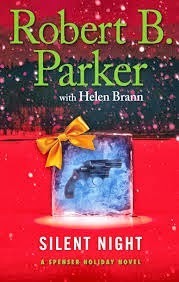 Silent Night is "a Spenser holiday novel," according to the cover. It was the novel Parker was working on when he died, and was written with Helen Brann.
Silent Night is "a Spenser holiday novel," according to the cover. It was the novel Parker was working on when he died, and was written with Helen Brann.Brann's author's note at the book's end tells that she was Parker's literary agent for over thirty years. Soon after "Bob's" death, Brann was talking to Joan Parker, who wondered what would happen with this last novel.
"Without thinking, I heard myself say, 'Maybe I should try to finish it. Could I? Should I? What do you think?'"Joan Parker responded with an affirmative, "Go for it!" and the novel was finished.
The question is, of course, how this novel stacks up against all the other Spenser novels, and I can assure that this novel was an enjoyable read.
This case by Spenser takes place during the Christmas season, and at one place in the novel, Dickens is even alluded to. That supplies a subtle background comparison for the action. There is a turkey (actually a "turducken" in this novel), a street urchin, and the motif of giving and embracing one's humanity.
I wouldn't taken that too far, though. I wouldn't characterize Spenser and Susan as the Cratchits or Hawk as Scrooge. The literary allusion is enriching, though, and characteristic of Parker's work in this series.
A homeless boy named Slide is in danger from the bad guys, and Spenser and Hawk aim to set things right with some tough-fisted and straight-shooting Christmas cheer.
If I had to choose anything that differs from all the other Spenser novels I've read, I'd say the some of the witticisms and repartee are, although completely within character, at times not as new as hoped for. Co-author Helen Brann was completing Parker's novel, though, and not striking off into new territory. (And, in all fairness, read enough Spenser novels, and some witticisms show up as retreads.)
This novel does provide some new insights into the lives of Spenser and his circle of friends, especially Hawk. I'd like to think that is somewhat due to Brann's influence, that she caught Parker's direction in the novel and added to the tome.
I don't know how finished the novel was when Parker died "in harness" before his keyboard. I'd like to think that Robert R. Parker's last novel ended with a collaborative effort with his longtime literary agent and friend Helen Brann and that because of her fingers on the keyboard, the novel contains a lovingkindness that extends beyond just plot. Such connections are in the spirit of the holidays--or holy-days--bringing more unity to the world.
Copyright 2014 by Thomas L. Kepler, all rights reserved
Published on January 02, 2014 10:05
December 31, 2013
It's Always Good to Start the New Year with a Laugh
 It's always good to start the new year with a laugh.
It's always good to start the new year with a laugh.And it my case, I'm also starting it with a one-month free trial of Netflix.
Signed up, Netflix asks you to rate movies you've viewed in order to provide data for the company's software to recommend movies from their catalog. I did this--this one's a three, that one's a four, and so forth, out of five stars possible.
The day moves on to evening, and I'm sitting on the floor, my laptop connected to our flatscreen TV via a HDMI cable. Demonstrating how to connect the flatscreen to the computer, how to open Netflix, and the cinema I'd added to my "list," I then scrolled down to "Our Recommendations for Thomas" to show my wife this function of the website.
And there is was--having crunched the numbers of my movie evaluations, Netflix told me that it was four-stars-out-of-five certain that Leave It to Beaver was a show I'd really like!

Now, I have nothing against Leave It to Beaver or The Andy Griffith Show or McHale's Navy, but my personal perspective on those shows is "been there, done that."
I haven't heard my wife laugh so completely in a long time, and even though I was somewhat nonplussed, soon I was laughing along with her. We started wondering how the recommendation arose. Did some young hotshot programmer think, "Yeah, he's over sixty, so he'll eat up that old-show stuff." Maybe the thinking is to throw in some leftfield possibilities "and see how he reacts."
Later, when reviewing more shows on Netflix's "personalizing" page, the pop-up mentioned that the site will "get better" at recommending shows for me as I continue to rate more and more titles.
I hope so.
I plan to keep my sense of humor, and we'll see at the end of our free month whether we keep our subscription. Maybe a chance for good laughs is worth $7.99 a month.
Copyright 2013 by Thomas L. Kepler, all rights reserved
Published on December 31, 2013 09:08
December 21, 2013
Sixkill, a Review of Robert R. Parker's Last Spenser Novel
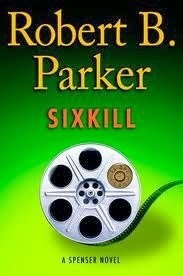 Meet Zebulon Sixkill in this Spenser detective novel, Robert B. Parker's last novel before his death.
Meet Zebulon Sixkill in this Spenser detective novel, Robert B. Parker's last novel before his death.Having read almost all of Parker's Spenser novels, I read Sixkill curious as to how it compared to the other 40 novels in the Spenser series. I am glad to say that it is not a novel written with diminished capacity but contains the twists and turns, the humor and insights, and the action and introspection one comes to expect from reading the Spenser novels.
Zeb Sixkill is a Cree Native American Indian and is a new character Parker introduced in his last novel. Parker follows a motif used in Early Autumn, an earlier (1980) Spenser novel, and has Spenser fill the role of role model and mentor for Sixkill. This was emotionally fitting for me, knowing that this was Parker's last novel before his passing, to see Spenser, now in middle age, passing on his knowledge and experience to another.
As in other Spenser novels, the author also engages the reader in considering racial, ethnic, gender, and professional stereotypes--and their negative impact on the individual and society. And, as in his other novels, Parker also emphasizes how individual choice impacts previous experience to produce a tangle of opportunities and challenges in life. These tangled skeins of life experience and individual and societal limitations are the essence of Parker's novels, and in Sixkill he continued that tradition of clashing opposites to spin gritty plots and late-night firefights.
Zebulon Sixkill--Cree Indian, football star, alcoholic, and man without a purpose--meets the guide for his hero's journey in this novel. How this meet-up between Spenser and Sixkill rolls out is the joy of this novel, filled with fists, wisecracks, and bloody death. It is fitting that we wonder what Parker would have done with the character Sixkill in future novels. Would Sixkill have been a significant yet peripheral character such as Hawk, a character in many other Spenser novels? Would Sixkill have had the main role in his own series of crime novels, such as the characters Jesse Stone and Sonny Randall? Would Spenser eventually have retired to advise Sixkill as he younger man became a private investigator, allowing the end of one generation and the beginning of a new?
That speculation is appropriate for the last Parker novel. At the last page, sentence, and word, we are satisfied with this episode in Spenser's life and also thoughtful--Parker, as always, simultaneously entertaining and enlightening.
Copyright 2013 by Thomas L. Kepler, all rights reserved
Published on December 21, 2013 06:00
December 7, 2013
A Day Out with Mom #23: Adjusting to new realities
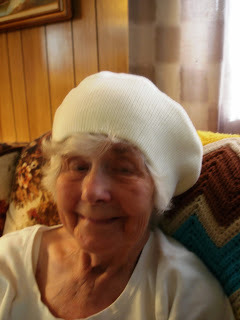 "Hello?" Mom answers the phone. "I can't hear. Is this Tom?"
"Hello?" Mom answers the phone. "I can't hear. Is this Tom?""Hi, Mom. How are you?"
"I can't hear. Is this Tom?"
My brother picks up the living room extension. "Mom, you didn't have to pick up in the bedroom. I was heading for the living room phone."
"I can't hear, Pat."
"I know, Mom," Pat hollers. "Come out here, and I'll put you on the amplified phone."
"I've got laryngitis and went to the doctor," Mom says. "I've been resting."
I tell her that's always best.
"Dad tried to stand on his own and fell," she adds, "but he's OK."
"Were the aides were with him?"
"No, when he was in his room alone."
I tell Mom I'm glad Dad's OK and think that his falling helps reinforce Mom's understanding that Dad is too feeble to come home. We are lucky to have that reinforcement without the pain and suffering of injury.
Grocery shopping and trips to the doctor are going well. The household routine is going well. My mom and brother are working together--probably even better than before my brother broke his leg.
I remember when I first arrived at my parents' mobile home seven months ago--twenty hours after the phone call from the social worker. Three strangers were in the mobile home, my parents sitting with these strangers, my brother in the hospital. Deer caught in the headlights, shocked by the sudden turn on events, at the mercy of the world--that was my first impression and turned out to be an accurate one. The look of relief on the faces of the social workers was my second impression.
After a stay of six and a half months with my family in California, I am now helping my family via internet and phone, also planning on regular visits every three or four months.
It's working and will continue working right up until the moment it stops working--which can be at any moment. I suppose that's the way it is every moment of our lives. The boundaries of "what works" tighten with infirmity, though. My parents cannot manage their lives alone. My brother and I provide "the Kepler boys" assistance.
It isn't always easy, but I know it is much more difficult for many others--children and parents. I'm good with "it's working for now."
It's important to find the good in every moment.
Right now, mine is to hear my mother answer the phone with her independent/dependent response: "Hello? I can't hear. Is this Tom?"
Blind, deaf, and a few weeks away from eighty-nine years, Mom still puts the "S" in spunk.
Copyright 2013 by Thomas L. Kepler, all rights reserved
Published on December 07, 2013 10:16



